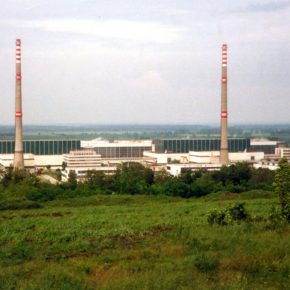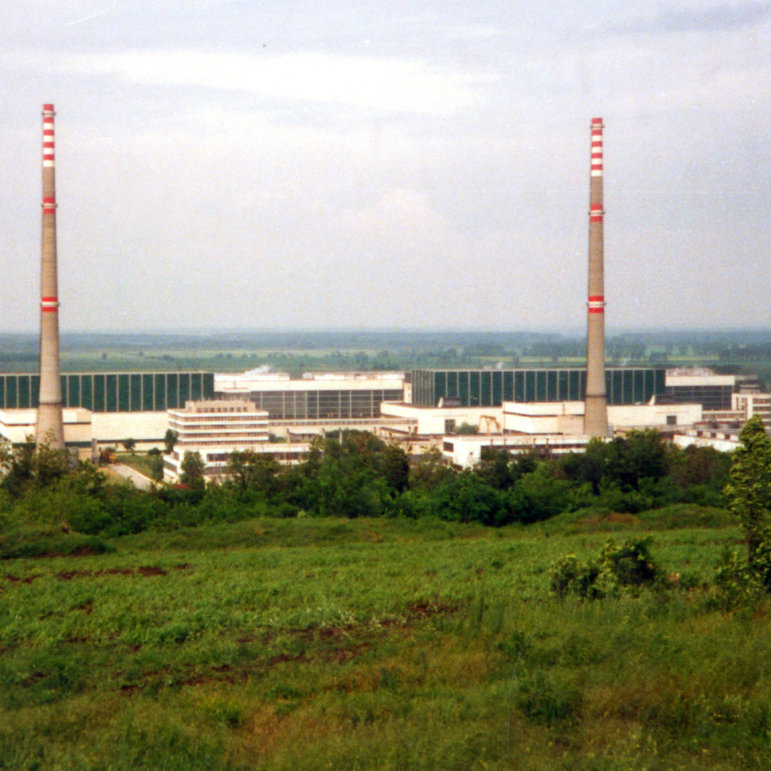
Kozloduy nuclear power plant, Bulgaria (IAEA Imagebank, CC BY-SA)
Bulgarian National Electricity Company (NEK) is in the process of implementing 30 year-life extensions for reactors 5 and 6 at the plant, the licenses of which expire in 2017 and 2019, respectively. The whole process needs the approval of EWRC, the Bulgarian water and energy regulator. This could lead to further delays in the proposed unit 7 of the plant, due to the time-frame into which the existing plants have to be upgraded.
The two units are likely to need a number of further upgrades prior to applying to the country’s nuclear regulator for 30 year life extensions. Normally, reactors must be turned off when upgrades, maintenance or refuelling work is undertaken.
The Bulgarian government and Westinghouse were in exclusive negotiations of the terms of Kozloduy-7 for over 18 months. However, a review of Bulgaria’s energy needs after the VVER reactors at Kozloduy-5 and -6 are switched off is necessary before any further decisions are taken, and is already under way. In addition, the Bulgarian government is unwilling to invest billions of BGN in a new reactor it may not necessarily need, as the country already has an electricity surplus.
New potential investor
Westinghouse has suggested a Chinese investor for the potential new EUR10bn (BGN20bn) unit 7, a price tag that seems to exceed the cost of other new nuclear plants under construction in Europe, even those using the latest EPR technology.
In France, EDF and Areva are building the 1,650 MW Flamanville-3 EPR, which is due to start in 2018, although slight delays are expected as a result of reactor pressure vessel testing at the unit. The plant’s cost was originally EUR2,9bn (GBP2,1bn), but rose to EUR10,07bn (GBP7,3bn) due to a 6-year delay of the original launch date in 2012. This is still cheaper than the cost suggested by Westinghouse for Kozloduy-7. In addition, potential delays and extra costs cannot be excluded from any financial analysis of new nuclear power plants.
The Finnish Olkiluloto-3 EPR is also due online in 2018, following extended delays from the original launch date of 2009. China has already successfully built a number of new EPRs, with the latest, Taishan-1 and -2, due to become operational in 2016 and 2017, respectively.
Following the confirmation by China General Nuclear Corporation (CGN) in October, during the state visit to the UK of Chinese President Xi Jinping, that it will take a 35 per cent of stake valued EUR33,1bn (GBP24bn) of Hinkley Point C, EDF, on current plans, will hold a majority stake of 55 per cent in the planned Hinkley plant. Final Investment Decision for Hinkley is now set to complete by the end of spring 2016, although EDF is still looking for another investor to take 15 per cent in the project.
In addition, China is planning to build over 20 new nuclear plants over the next few decades on its own soil and is well positioned to offer both investment and engineering capacity and build a potential new plant in Bulgaria.
„Bulgaria has not got such an amount of funds to invest in a new nuclear plant and we have yet to see if we get an investor and if at the end we will need a new power plant,” Borissov said in China. „Our framework agreement with Westinghouse has expired, while the company is not willing to invest in Kozloduy 7.”
„We have made preliminary meetings with the Chinese investors suggested by Westinghouse, but a decision on this matter will be taken at a later stage,” Borissov said in a public statement during his visit to China. “In any case, the investor will have to pay half of the price for the new plant,” he added.
„If Bulgaria needs to import electricity after Kozloduy 5 and 6 switch off, we will need to review our position on Kozloduy 7, as currently Bulgaria has sufficient energy resources and exports electricity to its neighbouring countries,” Borissov said. „If we have to import electricity at later stage, we would also consider parallel preliminary negotiations with neighbouring countries,” he added. During his visit to Shanghai, Borissov also discussed a number of new potential infrastructure projects in Bulgaria, following meetings with Premier Li Keqiang and with Shanghai’s Mayor Yang Xiong.
Gas or electricity
Following Russia’s switch off of its gas supply to Ukraine in October, Borissov said that Bulgaria has sufficient gas storage and stored gas, although the gas pressure was lower at the event. Meanwhile, Germany has suggested reviving the idea of North Stream 2, which would supply Germany with Russian gas via a pipeline under the Baltic Sea. When this project was announced, it was opposed by 10 EU countries, including initially Bulgaria, which later withdrew its opposition.
It seems that given the current geostrategic situation and Bulgaria’s ambition to eventually become a regional gas hub, the country is now again considering a new nuclear plant as a more politically neutral, cleaner and a long-term solution for the country’s energy needs. However, in Central Europe, gas supply challenges are set to continue to play a part in decisions over new nuclear plants.
Meanwhile, Bulgaria has launched the trial of its first day-ahead energy exchange, the Independent Bulgarian Energy Exchange, IBEX (more here), with which it will finalise the liberalisation of its electricity market. Three major players, Kozloduy 5 and 6, BEH and Maritza – 2 coal fired power plant are the initial participants in IBEX.
Rumyana Vakarelska is Editor-in-Chief, Team New Europe, a political Action-Tank

